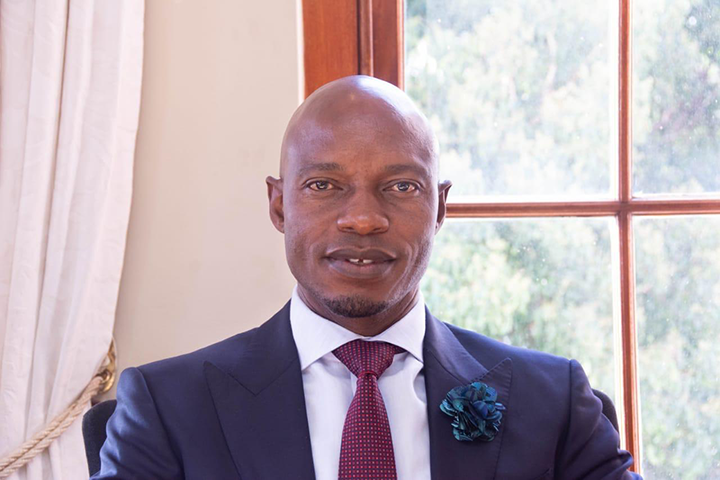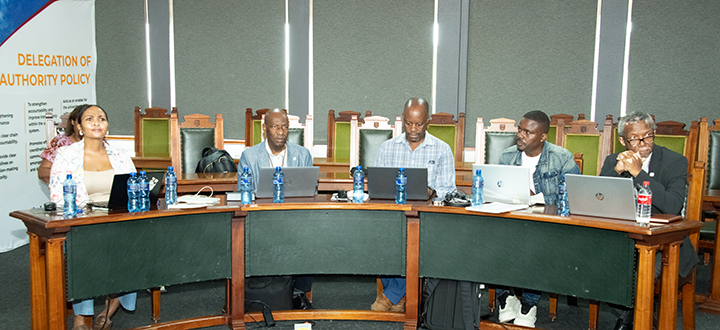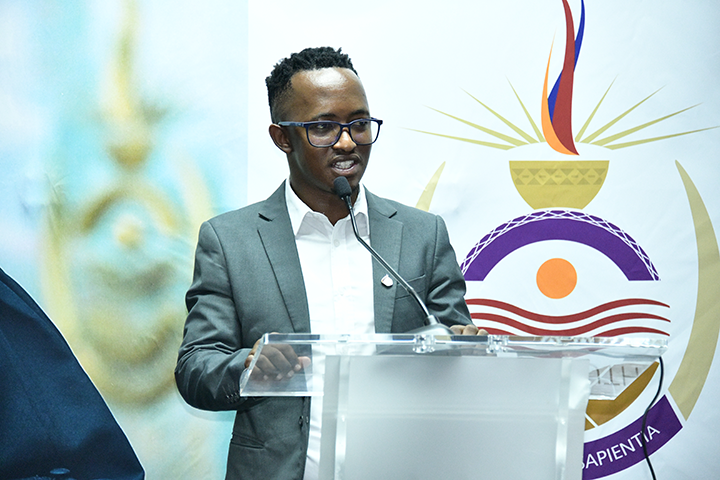News & Events
Dr Monhla announced as new Convocation representative to Council
On 14 and 15 March 2025 the Unisa Convocation held its annual general meeting (AGM) where Dr Elias Monhla was announced by Crystel Africa, Chief Electoral Officer for Convocation e-voting, as the newly elected Unisa Convocation representative to Council. He will be working alongside Unisa Convocation President, Justice Dabampe.

Newly elected Convocation representative to the Unisa Council, Dr Elias Monhla
Every Unisa graduate with a degree or diploma is a member of the Convocation and is entitled to attend an annual meeting. Convocation membership also refers to permanent academic employees of the university, including the Principal and Vice-Chancellor, vice-principals, the Registrar, the Deputy Registrar, professors emeriti, retired academic employees, and honorary graduates.
At Unisa, the Convocation is responsible for raising matters of concern about the development of the university. An annual meeting provides first-hand information about the strategic direction of the university, policy formulations and other development issues.
In addition, the Convocation advises council or management on matters of present interest and assists the university and the Unisa Foundation with fundraising. It also nominates persons for awards and honorary degrees.
Mandate of the Convocation
In his opening address, Professor Solomon Magano, Acting Vice-Principal: Institutional Development (on behalf of Professor Puleng LenkaBula, Unisa Principal and Vice-Chancellor) welcomed the distinguished guests comprising the university’s vast national and international alumni network, various heads of the university’s units, forums and organised labour. “It is with absolute delight and the greatest of pleasure that I welcome you this annual gathering of the university’s Convocation,” he said.

From left: Segopotse Malema, Committee Officer: Convocation, Prof Moloko Sepota, Acting Registrar, Dr Colen Tuaundu, Unisa Alumni Chairperson and Director of Academic Development and Support at the Namibia University of Science and Technology, Lebohang Mokoatle, Acting Manager: Committee Services, and Prof Solomon Magano, Acting Vice-Principal: Institutional Development
Continuing, Magano said that in the State of the Nation address, President Cyril Ramaphosa reaffirmed the government’s commitment to fostering inclusive growth, creating employment opportunities, and strengthening the resilience of the country’s economic growth, adding: “Unisa has a fundamental role to play in advancing these national objectives. Our financial and investment strategies must not only ensure institutional sustainability, but in addition, align with the broader economic imperatives of job creation, skills development and social transformation.”
Magano said that it commonly known that a convocation at higher institutions in the country is a statutory body constituted largely by the largest constituency, which at Unisa is approximately more than one million of the university’s alumni. He added: “It remains imperative that the Convocation does not only arise from its constituency, that is, to fulfil its statutory requirements, but lies largely in the support such a constituency provides to the university in its quest to enhance quality student learning experiences and the delivery of high-quality education.”
Concluding, Magano said that the role of the Convocation has been accepted as universal and necessary for the sustainability of any university in the world, reminding the audience of the Convocations’ core mandates, which are
- to represent the interests of the university’s alumni in the affairs of the university
- to raise funds for financially needy students who are excelling academically
- to promote academic excellence
Prioritising student needs
In his welcome address, Convocation President Justice Dabampe said that the primary responsibilities of the Convocation towards students is to ensure that they have the resources, support and opportunities necessary to succeed. He continued: “As alumni, we know that education can transform lives, end cycles of poverty, build successful communities, and create opportunities for all.”

President of the Unisa Convocation, Justice Dabampe
Continuing, Dabampe said that education is not just about providing knowledge, but also removing the barriers that prevent deserving students from being successful, adding that as part of the Convocation’s commitment to student support, the Unisa Foundation has allocated more than R30 million to support students who are left with a few modules to graduate. He stated that going forward, this will be an annual trend for the Convocation.
Dabampe stressed that these initiatives towards supporting the primary stakeholder of the university, that is its diverse student population, is to ensure the provision of a lifeline to students who are unable to graduate due to financial constraints. Additionally, Dabampe said that the Unisa Foundation has allocated various bursaries which directly supports more than 6 000 students. “This will enable them to finish their academic journey and join the ranks of the university’s alumni, who are testament to the transformative power of the university’s impactful and high-quality education,” he added.
Concluding, Dabampe said that the Convocation remains committed toward raising funds for students through donors and partnerships build from the university’s diverse alumni network.
The Unisa Convocation exists to make and support key decisions that influence the direction of the university, through policy formulation, and other matters that shape the university’s teaching and learning agenda, aligned with national and global key imperatives such as the United Nation’s 2030 Agenda for Sustainable Development, the National Development Plan 2030, and other goals created to ensure that the university remains a top provider of accessible and high-quality education in tandem with societal needs.
Monhla’s election to represent the Convocation at the University’s Council – the highest decision-making body of the university – demonstrated the Convocation members’ trust in his leadership and confidence in his abilities to advocate for their interests, including those of the university’s students.
* By Godfrey Madibane, Acting Journalist, Department of Institutional Advancement
** Photography by Shooheima Champion, Multimedia Centre
Publish date: 2025-03-18 00:00:00.0

